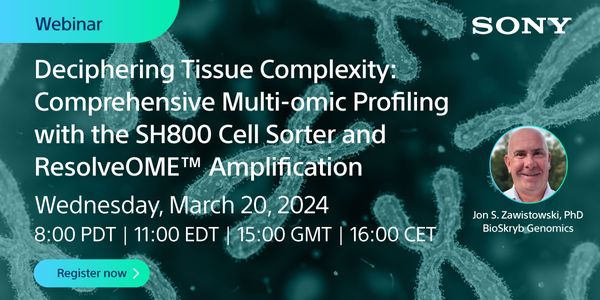Single cell profiling
Single cell profiling is a scientific technique to evaluate all components of a single cell. Single cell profiling analyzes the sequence of DNA in a cell providing information on factors including surface protein expression and antigen specificity. Data learned from single cell profiling can be used to detect diseases or provide personalized treatments.
-
MAR 20, 2024 | 8:00 AMDeciphering somatic mosaicism in healthy tissues and clonal diversity in tumors necessitates single-cell analysis. High-quality genomic and transcriptomic data at the single-cell level depen...FEB 28, 2024 | 10:00 AMMariana Kiehl (Sr. Applications Scientist at Roche Sequencing & Life Science) describes the KAPA Total Prep FFPE workflow, a novel single-tube method for combined sequencing of DNA and R...NOV 09, 2023 | 6:00 AMIn this talk we will explore the application of Multiplexed Error-Robust Fluorescence in situ Hybridization (MERFISH) technology to decode spatially regulated disease drivers in human heart...OCT 24, 2023 | 9:00 AMDNA comprises molecular information stored in genetic and epigenetic bases, both of which are vital to our understanding of biology in health and disease. The interaction of genetics with th...OCT 10, 2023 | 10:00 AMC.E. CREDITSFor patients with advanced non-small cell lung cancer (NSCLC), tissue samples are typically small biopsies. These samples undergo standard of care evaluation for >10 biomarkers to identif...Employing a metagenomic search, we identified a family of miniature CRISPR-Cas type V-L systems capable of RNA-guided dsDNA target cleavage without a tracrRNA. A bacterial depletion screen r...
JUL 20, 2023 | 8:00 AM
Single-cell ATAC-seq (Assay for Transposase-Accessible Chromatin using sequencing, scATAC-seq) is a relatively new and powerful technique that allows researchers to identify open chromatin r...
MAY 31, 2023 | 11:00 AM
Date: May 31, 2023 Time: 11:00am (PDT), 2:00pm (EDT), 8:00pm (CET) Single-cell genomics has facilitated the understanding of mechanisms involved in various biological processes such as tumor...
...
...
...
...
MAR 29, 2023 | 8:00 AM
Date: March 29, 2023 Time: 8:00am (PDT), 11:00am (EDT), 5:00pm (CEST) Cell IDx's UltraPlex multiplex technology enables high throughput multiplex fluorescent and multiplex chromogenic IH...
MAR 01, 2023 | 8:00 AM
Date: March 01, 2023 Time: 8:00am (PST), 11:00am (EST), 5:00pm (CET) Characterizing metastasis remains key for understanding and eradicating cancer. The study of circulating tumor cells (CTC...
FEB 14, 2023 | 10:00 AM
Date: February 14, 2023 Time: 10:00am (PST), 1:00pm (EST), 7:00pm (CET) The dorsal pontine tegmentum (PnTg) is part of the Pons, the largest section of the brainstem. It is a complex region...
NOV 17, 2022 | 7:00 AM
Date: November 17, 2022 Time: 7:00am (PST), 10:00am (EST), 4:00pm (CET) In order to truly understand cell biology, researchers need easy-to-use tools that preserve the natural complexity of...
OCT 20, 2022 | 9:00 AM
Date: October 13, 2022 Time: 11:00am (PDT), 12:00pm (EDT), 6:00pm (CEST) Single-cell atlases mapping immune cells provide hints on how immune cells mature, attenuate, and disseminate through...
OCT 19, 2022 | 6:00 AM
Date: October 19, 2022 Time: 6:00am (PDT), 9:00am (EDT), 2:00pm (CEST) It is important that clinical drug candidates not only have appropriate affinity and target specificity, but also have...
OCT 11, 2022 | 8:00 AM
Date: October 11, 2022 Time: 8:00am (PDT), 11:00pm (EDT), 5:00pm (CEST) Multiomic profiling of cell populations at single-cell resolution is revolutionizing scientists’ understanding o...
Date: September 29, 2022 Time: 8:00am (PDT), 11:00am (EDT), 5:00pm (CEST) Adeno-associated virus (AAV) is one of the most widely used delivery vehicles in gene therapy. To ensure the safety...
SEP 27, 2022 | 10:00 AM
Date: September 27, 2022 Time: 10:00am (PDT), 1:00pm (EDT), 7:00pm (CEST) Alzheimer’s disease is the most common cause of dementia and the seventh leading cause of death in the United...
MAY 31, 2022 | 9:00 AM
Date: May 31, 2022 Time: 9:00am (PDT), 12:00pm (EDT), 6:00pm (CEST) Introducing Nanostring’s latest spatial platform, CosMx Spatial Molecular Imager (SMI). Offering high-plex, multiomi...
MAY 19, 2022 | 8:00 AM
Date: May 19, 2022 Time: 8:00am (PDT), 11:00pm (EDT), 5:00pm (CEST) Mass spectrometry (MS)-based proteomic technologies are increasingly applied in a clinical context for disease classific...
Cancers are genetic diseases driven by recurrent sets of somatic mutations. Different mutations associate statistically with distinct disease risks and can therefore be useful prognostic mar...





















